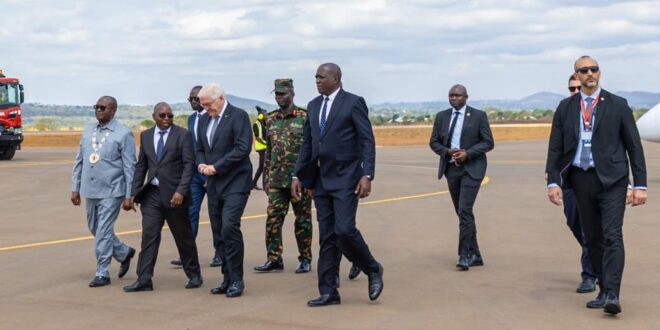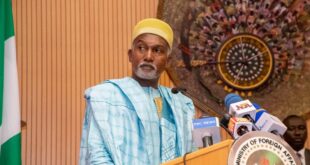An urgent appeal has gone to the German government for a better treatment of African applicants for visas to visit the country.
Across the continent, Africans are facing immense hurdles to legally obtain visa to enter Germany for the purposes of business, to attend conferences or trade fairs, for leisure visit, to study or receive training.
In the appeal addressed to German Foreign Minister Annalena Baerbock, the chairperson of The African Network of Germany (TANG), Dr Sylvie Nantcha, said the procedure of issuing to Africans had reached “a level that must be described as scandalous”.

Nantcha said applicants “now have to wait up to 6 to 12 months for a response” to their visa applications. “This is not only disproportionately long, but also unacceptable,” she added.
Added to the long waiting time is the fact that Africans record the highest rejection rate of their applications compared to other world regions, the letter points out.
READ ALSO German embassies discriminate against young visa applicants in Africa
Among the consequences of long visa processing times and the high rejection rate is that African business people are discouraged from visiting Germany and trading with the country.
Another group affected by the visa hurdle are young people who have gained admission to study or receive training in Germany. Despite possessing all the required papers, these youth face enormous difficulties to get even interview appointments at German embassies that they end up missing the commencement of their studies or training.
Nantcha said discouraging young people from seeking regular routes of travelling to Germany could only promote irregular migration to the country from Africa.
She therefore appealed to Minister “to take personal and immediate action to revise the visa issuing practice for Africans”.
Here’s the full text of the letter by Dr Sylvie Nantcha to Ms Annalena Baerbock:
“It is with the greatest concern that we turn to you today to draw your attention to an extremely precarious matter that must no longer go unnoticed. The current procedure of the Federal Foreign Office in issuing visas to African citizens is not only extremely problematic, but has now reached a level that must be described as scandalous.
“In recent years, we have seen a drastic deterioration in the procedure. While Africans, especially those who have already travelled within the Schengen area, recently received a visa from the German embassy within 2 to 3 weeks, they now have to wait up to 6 to 12 months for an answer. This is not only disproportionately long, but also unacceptable.
“In order to apply for a visa, extensive applications with several pages have to be submitted electronically. After that, the applicant remains in complete uncertainty, as it is not possible to make enquiries. It takes many months to receive a response, with a shocking 30% of applications from Africans being rejected. In comparison, the rejection rate in Thailand is only 10% and in Latin America 20%. This practice has a serious impact on economic, cultural, scientific and development co-operation with Africa.
“The economic impact is serious. The long visa processing times and the high rejection rate discourage business people and investors from Africa who would like to visit Germany and promote trade relations and investments. This represents a significant hurdle for economic cooperation between the continents.
“But cultural and scientific cooperation is also suffering under the current visa regulations. The free exchange of artists, students and scientists between Germany and Africa is considerably hindered. This slows down the cultural wealth and scientific progress of both regions.
“Germany is heavily involved in development co-operation with African countries. However, the difficulty in obtaining visas considerably delays the realisation of development projects. Employees and experts from Africa often have to wait months for their visas, which jeopardises the sustainability and effectiveness of these projects.
“Paradoxically, current visa practices could even favour irregular migration. People who cannot find legal ways to get to Germany may be tempted to enter illegally. Easier visa issuance for authorised applicants could help to reduce the number of irregular migrants.
“We urgently appeal to you to take personal and immediate action to revise the visa issuing practice for Africans. Germany must strengthen its relations with “Africa and promote co-operation instead of hindering it with bureaucratic hurdles. It is essential that bureaucratic barriers are removed and that the issuing of visas for Africans becomes fairer, faster and more transparent. This is not only in the interest of the people concerned, but also in the interest of Germany and its relations with Africa.
“The urgency of this matter cannot be emphasised enough. We hope for your commitment and support to prevent further damage to relations between Germany and Africa.
———-
About The African Network of Germany, TANG:
With more than 800 member associations and individual members, TANG is the largest federal network of African associations in Germany. TANG informs, advises, strengthens and networks African associations so that they can develop their full potential for shaping the future of our society.
The focus of TANG’s work is to help shape German integration and Africa policy through participation in expert forums and discussion platforms such as the Forum against Racism or the review of the National Action Plan for Integration. TANG also carries out numerous projects with the support of the federal ministries.
More information about TANG at: www.tang-ev.de
 THE AFRICAN COURIER. Reporting Africa and its Diaspora! The African Courier is an international magazine published in Germany to report on Africa and the Diaspora African experience. The first issue of the bimonthly magazine appeared on the newsstands on 15 February 1998. The African Courier is a communication forum for European-African political, economic and cultural exchanges, and a voice for Africa in Europe.
THE AFRICAN COURIER. Reporting Africa and its Diaspora! The African Courier is an international magazine published in Germany to report on Africa and the Diaspora African experience. The first issue of the bimonthly magazine appeared on the newsstands on 15 February 1998. The African Courier is a communication forum for European-African political, economic and cultural exchanges, and a voice for Africa in Europe.
























